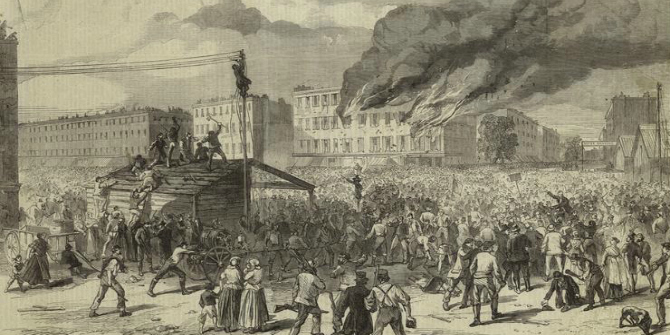The Eurocentric Conception of World Politics argues that throughout its history most international theory has been embedded within various forms of Eurocentrism. Kent Deng finds the book launches a devastating critique of the Western approach to world politics, one that should be noted by student and scholar alike.
 The Eurocentric Conception of World Politics, Western International Theory, 1760–2010. John Hobson. Cambridge University Press. 2012.
The Eurocentric Conception of World Politics, Western International Theory, 1760–2010. John Hobson. Cambridge University Press. 2012.
For those who are familiar with John Hobson’s works, this new monograph is without a doubt a step forward from the author’s 2004 book The Eastern Origins of Western Civilisation (Cambridge: Cambridge University Press) with the same hallmark of uncompromising critique of the mainstream Eurocentric and Eurofetish thinking in the academia and wider society. Let’s face it: rightly or wrongly a Eurocentric and Eurofetish mindset is still very common, and not just in the West. In this regard, Hobson’s new book will almost certainly refuel the on-going debate in and outside the field of international relations.
As usual, it is much harder to criticise one’s own culture than that of another’s. The author not only does it with heroic courage but he also does it with a high degree of moral consistency and technical detail, not to mention a panoramic view across two and a half centuries. To achieve that, Hobson systematically traces, disentangles and categorises changes and nuances in Eurocentricism over time as well as the common origin of this egotistical power-cum-belief which first perpetuated in Western Europe and then across the wider world.
The basic factors, according to Hobson, are racism, imperialism and a hierarchical world order. They have interplayed with each other and produced numerous kaleidoscopic patterns in the past 250 years. However, these factors and their movements all serve a common purpose of establishing and/or maintaining the political, economic and ideological supremacy of a self-declared ‘chosen group’ over the rest of the global communities. In other words, Eurocentricism has its clearly-marked exclusive and utilitarian trait. This is the first point to make.
Secondly, despite the commonly approved attitude in the civilised world today that ‘colour is only skin deep, inside we are all the same’, biological Darwinism (a benign hypothesis) often mutates into social Darwinism (a malignant proposition). The result is a deep-seated, near religious, belief in efficiency and sophistication. Once these two factors become the ultimate judge of how a society produces, exchanges, consumes and lives, some form of opinionated, judgemental social Darwinism becomes inevitable.
This brings to light the issue of longevity. In the natural world, longevity is often more important for the survival of the species than efficiency and sophistication. If so judged, the Chinese empire should be considered superior over all known empires and state hitherto. Unfortunately, Charles Darwin ranks the homo sapien well above the caetus (society) although the latter has much better track record of longevity. This really matters to the not-too-far future of our planet simply because the more efficient and sophisticated we are in terms of extracting our often un-renewable resources, the less longevity our human race can be guaranteed. Here, efficiency, sophistication and longevity are mutually exclusive.
Thirdly, with this noticeable defect in our modern thinking, once efficiency and sophistication are imposed as the normative criteria to assess different civilisations, racism becomes only natural and so do the discriminative labels such as barbarians, savages, despots, threats and perils. Internally, it becomes imperative for the society of efficiency and sophistication to ring-fence peoples of less efficient and sophisticated regardless of their track record of longevity in the history of civilisation. Externally, it becomes legitimate for the society of efficiency and sophistication to promulgate efficiency and sophistication in other peoples’ territories either for the benefit of the holder of efficiency and sophistication or merely for the sake of efficiency and sophistication per se. This is modern imperialism. The moral issue is whether this imposed efficiency and sophistication are a form of a public good. The truth in the recent world history is that such imposition often produces losers in a zero-sum game.
From efficiency and sophistication come the notion of a world order under which countries with less efficiency and sophistication should lose their old freedom and sovereignty to fit in a new and artificially created hierarchy where the most efficient and sophisticated nations such as G7 have more rights than the rest of the world. Any challenge to such world order will face political, economic and military hostility. The two world wars and the Cold War in the twentieth century prove this point.
Finally, the author indicates that as time goes by racism, imperialism and a hierarchical world order have evolved and become more and more efficient and sophisticated, no less, the Eurocentric and Eurofetish thinking has become ever more entrenched as demonstrated by the IMF, World Bank, OECD, NATO, and the ‘Washington Consensus’. However, there is a hope coming from Asia: the NICs, China and India that have already been challenging the cliché of ‘the West and the Rest’. We can reasonably assume that once these Asian countries reach the Western level of efficiency and sophistication in science, technology, and institutions, they will ring the knell for Western racism and imperialism and push the world to be a multipolar one.
Admittedly, this book is not particularly an easy read. It requires the reader to acquire a great deal of pre-knowledge in European and world history and history of political thoughts to be able to fully appreciate the years’ of toil on Hobson’s part. Even so, I strongly recommend this book to MSc/MA and PhD students of current affairs, international relations, world politics and world/global history.
——————————————————————————————-
Dr. Kent Deng is Reader in Economic History at the LSE and FRHistS. He teaches economic changes, growth and development in East and Southeast Asia from circa 1500 to the present day. He publishes widely on China’s very long-term history over two millennia, including the literati, peasantry, merchants, artisans, demography, currencies, property rights, taxation, knowledge transfer, market expansion, reforms and state governance. His most recent book, China’s Political Economy in Modern Times: Changes and Economic Consequences, 1800–2000 (Routledge, 2011) deals with state-building and its economic consequences. He is active in the media and routinely writes book reviews (34 in all). Read more reviews by Kent.








Thanks for the review!